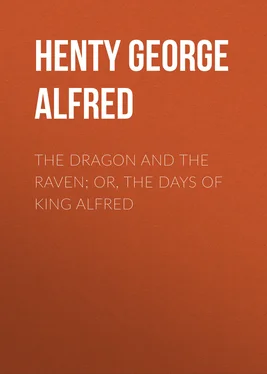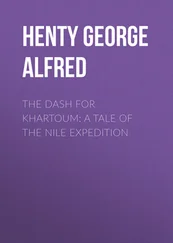George Henty - The Dragon and the Raven; Or, The Days of King Alfred
Здесь есть возможность читать онлайн «George Henty - The Dragon and the Raven; Or, The Days of King Alfred» — ознакомительный отрывок электронной книги совершенно бесплатно, а после прочтения отрывка купить полную версию. В некоторых случаях можно слушать аудио, скачать через торрент в формате fb2 и присутствует краткое содержание. Жанр: Альтернативная история, foreign_antique, foreign_prose, foreign_children, Исторические приключения, на английском языке. Описание произведения, (предисловие) а так же отзывы посетителей доступны на портале библиотеки ЛибКат.
- Название:The Dragon and the Raven; Or, The Days of King Alfred
- Автор:
- Жанр:
- Год:неизвестен
- ISBN:нет данных
- Рейтинг книги:5 / 5. Голосов: 1
-
Избранное:Добавить в избранное
- Отзывы:
-
Ваша оценка:
- 100
- 1
- 2
- 3
- 4
- 5
The Dragon and the Raven; Or, The Days of King Alfred: краткое содержание, описание и аннотация
Предлагаем к чтению аннотацию, описание, краткое содержание или предисловие (зависит от того, что написал сам автор книги «The Dragon and the Raven; Or, The Days of King Alfred»). Если вы не нашли необходимую информацию о книге — напишите в комментариях, мы постараемся отыскать её.
The Dragon and the Raven; Or, The Days of King Alfred — читать онлайн ознакомительный отрывок
Ниже представлен текст книги, разбитый по страницам. Система сохранения места последней прочитанной страницы, позволяет с удобством читать онлайн бесплатно книгу «The Dragon and the Raven; Or, The Days of King Alfred», без необходимости каждый раз заново искать на чём Вы остановились. Поставьте закладку, и сможете в любой момент перейти на страницу, на которой закончили чтение.
Интервал:
Закладка:
"'Tis well for me that you did not, my good Egbert," Edmund said, drying his eyes, "for what should I have done in this troubled land without one protector?"
"It was the thought of that," Egbert said, "that seemed to give me strength as I dashed at the Danes. And now, methinks, I am strong enough to walk again. Let us make our way far into the forest, then we must rest for the night. A few hours' sleep will make a fresh man of me, and to-morrow morning we will go to Croyland and see what the good abbot your uncle proposes to do, then will we to the hut where we dwelt before coming hither. We will dig up the chest and take out such valuables as we can carry, and then make for Wessex. After this day's work I have no longer any hope that East Anglia will successfully oppose the Danes. And yet the Angles fought well, and for every one of them who has fallen in these two days' fighting at least four Danes must have perished. Have you food, Edmund, for in truth after such a day's work I would not lie down supperless?"
"I have in my pouch here, Egbert, some cakes, which I cooked this morning, and a capon which one of the monks of Croyland gave me. I was tempted to throw it away as I ran."
"I am right glad, Edmund, that the temptation was not too strong for you. If we can find a spring we shall do well."
It was now getting dark, but after an hour's walk through the forest they came upon a running stream. They lit a fire by its side, and sitting down ate the supper, of which both were in much need. Wolf shared the repast, and then the three lay down to sleep. Egbert, overcome by the immense exertions he had made during the fight, was soon asleep; but Edmund, who had done his best to keep a brave face before his kinsman, wept for hours over the loss of his gallant father.
On the following morning Egbert and Edmund started for Croyland. The news of the defeat at Kesteven had already reached the abbey, and terror and consternation reigned there. Edmund went at once to his uncle and informed him of the circumstance of the death of his father and the annihilation of the Saxon army.
"Your news, Edmund, is even worse than the rumours which had reached me, and deeply do I grieve for the loss of my brave brother and of the many valiant men who died with him. This evening or to-morrow the spoilers will be here, and doubtless will do to Croyland as they have done to all the other abbeys and monasteries which have fallen into their hands. Before they come you and Egbert must be far away. Have you bethought you whither you will betake yourselves?"
"We are going to the king of the West Saxons," Edmund replied. "Such was my father's intention, and I fear that all is now lost in East Anglia."
"'Tis your best course, and may God's blessing and protection rest upon you!"
"But what are you going to do, uncle? Surely you will not remain here until the Danes arrive, for though they may spare other men they have no mercy on priests and monks?"
"I shall assuredly remain here, Edmund, at my post, and as my brother Eldred and Earl Algar and their brave companions died at their posts in the field of battle, so I am prepared to die here where God has placed me. I shall retain here with me only a few of the most aged and infirm monks, too old to fly or to support the hardships of the life of a hunted fugitive in the fens; together with some of the children who have fled here, and who, too, could not support such a life. It may be that when the fierce Danes arrive and find nought but children and aged men even their savage breasts may be moved to pity; but if not, God's will be done. The younger brethren will seek refuge in the fens, and will carry with them the sacred relics of the monastery. The most holy body of St. Guthlac with his scourge and psalmistry, together with the most valuable jewels and muniments, the charters of the foundation of the abbey, given by King Ethelbald, and the confirmation thereof by other kings, with some of the most precious gifts presented to the abbey."
Edmund and Egbert set to work to assist the weeping monks in making preparations for their departure. A boat was laden with the relics of the saints, the muniments of the king, and the most precious vessels. The table of the great altar covered with plates of gold, which King Wichtlof had presented, with ten gold chalices, and many other vessels, was thrown into the well of the convent.
In the distance the smoke of several villages could now be seen rising over the plain, and it was clear that the Danes were approaching. The ten priests and twenty monks who were to leave now knelt, and received the solemn benediction of the abbot, then, with Edmund and Egbert, they took their places in the boat and rowed away to the wood of Ancarig, which lay not far from the abbey.
The abbot Theodore and the aged monks and priests now returned to the church, and, putting on their vestments, commenced the services of the day; the abbot himself celebrated high mass, assisted by brother Elfget the deacon, brother Savin the sub-deacon, and the brothers Egelred and Wyelric, youths who acted as taper-bearers. When the mass was finished, just as the abbot and his assistants had partaken of the holy communion, the Danes burst into the church. The abbot was slain upon the holy altar by the hand of the Danish king Oskytal, and the other priests and monks were beheaded by the executioner.
The old men and children in the choir were seized and tortured to disclose where the treasures of the abbey were concealed, and were also put to death with the prior and sub-prior. Turgar, an acolyte of ten years of age; a remarkably beautiful boy, stood by the side of the sub-prior as he was murdered and fearlessly confronted the Danes, and bade them put him to death with the holy father. The young Earl Sidroc, however, struck with the bearing of the child, and being moved with compassion, stripped him of his robe and cowl, and threw over him a long Danish tunic without sleeves, and ordering him to keep close by him, made his way out of the monastery, the boy being the only one who was saved from the general massacre.
The Danes, furious at being able to find none of the treasures of the monastery, broke open all the shrines and levelled the marble tombs, including those of St. Guthlac, the holy virgin Ethelbritha, and many others, but found in these none of the treasure searched for. They piled the bodies of the saints in a heap, and burned them, together with the church and all the buildings of the monastery; then, with vast herds of cattle and other plunder, they moved away from Croyland, and attacked the monastery of Medeshamsted. Here the monks made a brave resistance. The Danes brought up machines and attacked the monastery on all sides, and effected a breach in the walls. Their first assault, however, was repelled, and Fulba, the brother of Earl Hulba, was desperately wounded by a stone.
Hulba was so infuriated at this that when, at the second assault, the monastery was captured, he slew with his own hand everyone of the monks, while all the country people who had taken refuge within the walls were slaughtered by his companions, not one escaping. The altars were levelled to the ground, the monuments broken in pieces. The great library of parchments and charters was burnt. The holy relics were trodden under foot, and the church itself, with all the monastic buildings, burnt to the ground. Four days later, the Danes, having devastated the whole country round and collected an enormous booty, marched away against Huntingdon.
Edmund and Egbert remained but a few hours with the monks who had escaped from the sack of Croyland; for, as soon as they saw the flames mounting up above the church, they knew that the Danes had accomplished their usual work of massacre, and there being no use in their making further stay, they started upon their journey. They travelled by easy stages, for time was of no value to them. For the most part their way lay among forests, and when once they had passed south of Thetford they had no fear of meeting with the Danes. Sometimes they slept at farm-houses or villages, being everywhere hospitably received, the more so when it was known that Edmund was the son of the brave ealdorman Eldred; but the news which they brought of the disastrous battle of Kesteven, and the southward march of the great Danish army, filled everyone with consternation.
Читать дальшеИнтервал:
Закладка:
Похожие книги на «The Dragon and the Raven; Or, The Days of King Alfred»
Представляем Вашему вниманию похожие книги на «The Dragon and the Raven; Or, The Days of King Alfred» списком для выбора. Мы отобрали схожую по названию и смыслу литературу в надежде предоставить читателям больше вариантов отыскать новые, интересные, ещё непрочитанные произведения.
Обсуждение, отзывы о книге «The Dragon and the Raven; Or, The Days of King Alfred» и просто собственные мнения читателей. Оставьте ваши комментарии, напишите, что Вы думаете о произведении, его смысле или главных героях. Укажите что конкретно понравилось, а что нет, и почему Вы так считаете.












